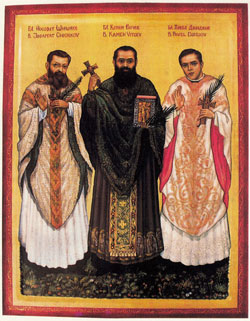
Peter Vitchev, also known as Kamen Vitchev, was a Bulgarian Eastern Catholic and an Assumptionist priest who was martyred by the Bulgarian communist regime. He was beatified by Pope John Paul II on 2002.
Biography
Early life and priesthood
Vitchev was born on May 23, 1893 at Srem, near Topolovgrad, Bulgaria and came from a peasant Orthodox family. He joined the Catholic congregation known as the Assumptionists, or Augustinians of the Assumption, in 1910, beginning his novitiate in Gempe, Belgium, and later taking the name Kamen. He pursued his studies of philosophy and theology in Louvain, Belgium. He was ordained a priest in Constantinople (Istanbul) on December 22, 1921. After a brief period teaching at St. Augustine College in Plovdiv, Bulgaria, and at a high school seminary in Kumkapı, Turkey, he returned to Strasbourg and Rome, to complete his studies and obtained a doctorate in theology in 1929.
Bulgarian communist regime
Very knowledgeable in the history of the Bulgarian church, Vitchev published several articles in the review known as Échos d'Orient. In 1930 he was appointed professor of philosophy and Dean of Studies at St. Augustine College in Plovdiv and maintained this position until the school was closed by the Communist regime on August 2, 1948.
After this prestigious institution founded and maintained by the Assumptionists was closed, Vitchev became superior of the Assumptionist seminary in Plovdiv which housed a small number of students. That same year all foreign members of religious orders were expelled and Vitchev was named Vicar-Provincial of the remaining Bulgarian Assumptionists. They numbered 20 and staffed 5 Oriental and 4 Latin rite parishes.
As a Soviet satellite, Bulgaria suffered from the wave of anti-Church legislation that swept the bloc in the years after World War II (e.g. the arrest of Archbishop Aloysius Stepinac in Yugoslavia in 1946, of Cardinal József Mindszenty in Hungary in 1948, of Archbishop Josef Beran in Czechoslovakia in 1950, and of Cardinal Stefan Wyszyński in Poland in 1953).
Death
Highly esteemed and respected by the influential young graduates of St. Augustine College, Vitchev posed a threat to the Communist authorities in Bulgaria and was arrested on July 4, 1952. After what international organizations universally considered a show trial which began on September 29, 1952 and ended with a guilty verdict and a death sentence on October 3, Vitchev, two of his Assumptionists companions, Josaphat Chichkov and Pavel Djidjov, and a Passionist bishop, Eugene Bossilkov, were shot to death, without public notice, at approximately 11:30 PM the evening of November 11, 1952.
Beatification
Vitchev was declared a martyr for the faith and beatified by Pope John Paul II in Plovdiv on May 26, 2002. On July 28, 2010, the Bulgarian parliament passed a law officially rehabilitating all of those who had been condemned by the People's Republic of Bulgaria in 1952, including Vitchev.





